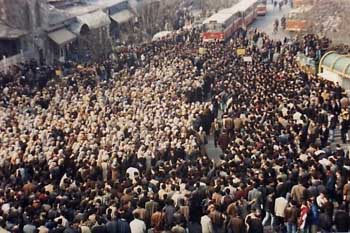
|
unsubscribe |
|
|
|
Since the "soft coup" by the army in 1997, persecution of not only those holding Islamic political beliefs has ensued, but against all professing to be practising Muslims. State employees are banned from wearing a beard, and in the case of women of wearing a headscarf. They are not allowed to pray at work, and risk loosing their jobs if they are spotted praying in public. Recently the army itself purged several generals who were discovered to be praying at home. Hijab Ban Women wearing headscarves have been banned from universities across the country, since the beginning of the 1998 academic year. Whilst some Deans of Faculties have not implemented this ban, the majority have infact barred students sporting the hijab (Islamic covering, veil, headscarf) from even entering university grounds. This had led to the daily scenario of police being called to campuses to remove women students who have attended wearing the hijab. In a demonstration across Turkey on October 11, 1998, 4 million protestors (Turkish Interior Ministry estimate) formed a human chain in various cities. Treason charges are pending against several journalists, lecturers and students who participated in this peaceful protest.  Government paranoia as to Islamic opposition has seen a number of high profile arrests against politicians. The Mayor of Istanbul, Recep Tayyip Erdogan, received a ten month prison sentence for causing division in society under Article 312. He had infact read out a piece of Ottoman poetry. Whilst the Rapporteurs were in Turkey, the 75th celebrations of the Republic took place. Another mayor in Eastern Turkey, was arrested on that day, for remarks he had made two years earlier in a meeting, stating that the state worship of Attaturk was a polytheist practice. He also awaits trial on treason charges. The law of promoting racial division has also been used against political opponents. One newspaper sub-editor faces 152 years in prison on 30 different counts of this charge related to an article he wrote criticising the envigorated alliance between Turkey and Israel. Bekir Yildiz is the elected mayor of Sincan province. He organised a
rally in support of the Palestinian right of self-determination. He was
sentenced to 4 years in prison in September 1997 for promoting Islamic
ideas.
 Whilst in Turkey, IHRC Rapporteurs visited Bandirma Prison. This prison is situated across the Bosphorous from Istanbul, in the Asian part of Turkey. There many political prisoners are incarcerated. The existence of political prisoners in Turkey is openly acknowledged. Their prisoner status is classified as political, and their treatment is markedly different. A case in point was noted by Rapporteurs on their visit to Bandirma. Whilst criminal prisoners were allowed open and free access to their visitors on special occasions (IHRC Rapporteurs visited on Republic Day), political prisoners could only be spoken through a series of bars and reinforced plastic sheeting. To speak to the prisoners, visitors had to speak through four layers of metal sheeting with bore holes next to the bars, which of course precluded sight of the prisoners making communication long and laborious. Some of the prisoners complained about torture at the hands of guards. Those who complained were those who were detained without charge - the purpose of torture presumably being to extract confessions. At meetings with prisoners’ families and lawyers, the Rapporteurs were advised of various methods of torture used against prisoners. These included:
|